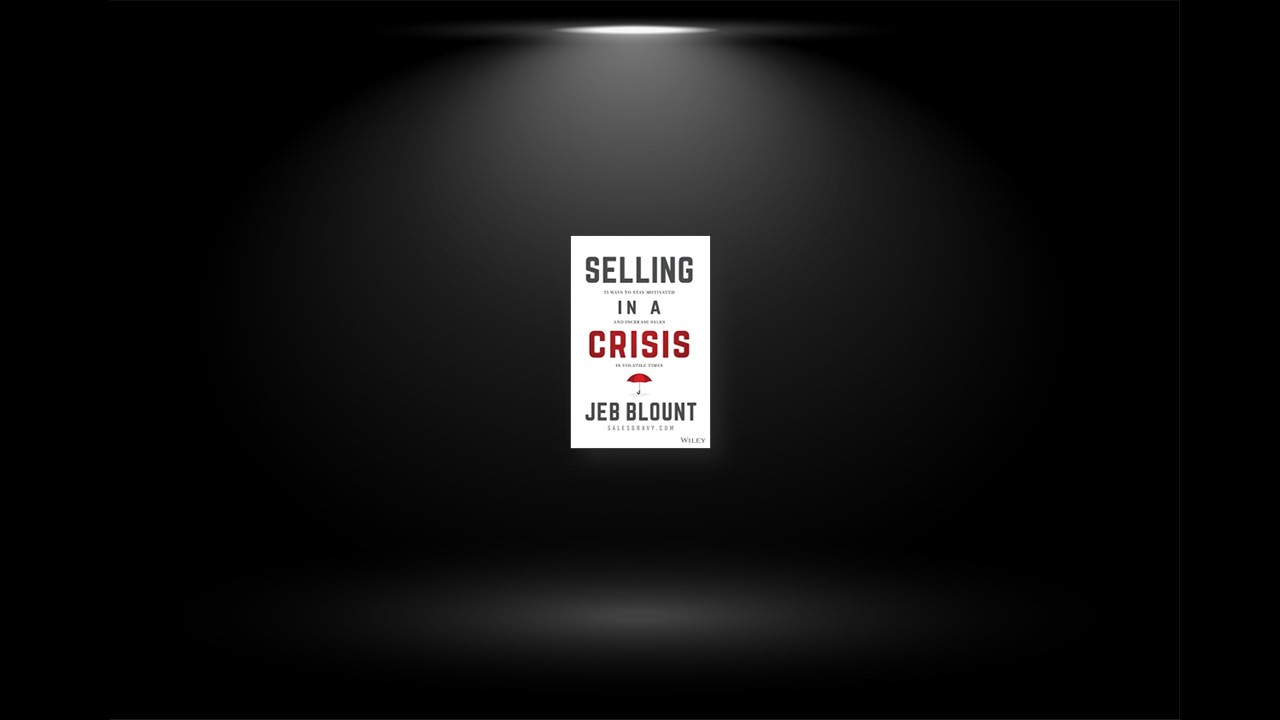Look Forward, Not Backward
The key to outselling a crisis is action. The strong look forward, not backward. Those who quickly adapt and innovate thrive. The determined and persistent win. The rainmakers find a way to make it rain. In volatile times, the salespeople who rise and survive are the ones who become disciplined, focus on the fundamentals of sales, make smart choices, and maintain a winning mindset.
There will certainly be doors that close, but there will be many, many more that open. Your success in capturing these opportunities lies in your willingness to create a new vision for your future, energize yourself, do the hard work, and resolve to look through the windshield rather than in the rearview mirror.
Only Three Things You Can Control
Worrying is exhausting and drains your energy. It’s like pushing a rope. You work and work, pushing harder and harder, but you accomplish nothing. The first and most important step in breaking this awful cycle is coming to grips with a fundamental truth: There are only three things you can control: 1) Your actions 2) Your reactions 3) Your mindset. Nothing more. You have no control over your present circumstances, and you are not defined by them. However, you do control and will be defined by your response.
To outsell this crisis, it is crucial that you acknowledge the truth and step back from your emotional need to find Easy Street. Rather than worrying about the things that are out of your control, focus your energy on what you can control: your choices, emotions, goals, ambitions, dreams, desires, discipline, actions, and most importantly – your mindset.
This Aint Easy Street
In a crisis, you fear making mistakes. You question your judgment, doubt your intuition, and become overwhelmed with worry. Sometimes, in a state of panic, you’ll make rash decisions and do dumb things that compound your problems. In this state, it’s all too easy to succumb to fear and become paralyzed and immobile.
However, inaction is as dangerous as the crisis itself. Action may not always take you down the path you desire, but inaction leads to certain failure. You cannot sit still and do nothing. You cannot wait around for things to change. You must take action right now, and the most important action you can take is prospecting! That’s the real difference between rain barrels and rainmakers. Salespeople who are like rain barrels wait around for something to happen to them, mouths gaped open, hoping that a lead might fall from the sky.
Talk to People
There is a simple truth: The more people you talk with, the more you will sell. The good news is that there are a lot of people to talk with. The bad news is that in volatile times, fewer people are buying.
Still, even in the deep, dark depths of a financial meltdown, there are always companies and people who are purchasing. To find them, you’ve just got to sift through the ones who aren’t. Talking with the right people in a crisis is challenging, especially when they don’t want to talk with you. It can be frustrating and difficult to face a steady stream of rejection. But, it doesn’t change the fact that talking with people s your job, and you must do whatever it takes to engage as many people in conversations as possible.
Message Matters
To craft relevant messages, simply stand in your prospect’s shoes. Consider how you might feel in their situation. Consider their emotions. Connect to how they are feeling. Start with basic but important questions: What’s important to your prospect? What emotions are they experiencing at the moment? If you were in their situation, what would compel you to meet with you?
Because prospects engage for their reasons, not yours, in a crisis, more than at any other time, your message needs to be hyper relevant. When prospects feel that you get them and their problems, they’ll be more likely to meet with you.
Relevant is the key. The person you are calling could not care less about your product, service, or features. They don’t care about what you want or what you would “love” or “like” to do. They don’t care about your desires, your quota, or that you are “going to be over in their area.” Your prospect only cares about their problems, and in an economic crisis they’ve got lots of problems. They’ll likely have different problems during a crisis than they had before the downturn.
Eat The Frog
Frenchman Nicholas Chamfort advised people to “swallow a frog in the morning if you want to encounter nothing more disgusting the rest of the day.” The biggest frog in your sales day is prospecting. This is the activity you are most likely to procrastinate on if you don’t jump on it first thing in the morning. Frogs don’t get more appetizing as the day goes on. The longer they sit there, the slimier and stinker they get. That’s when the bargaining starts. Instead of just eating your frog and getting it over with, you make empty promises with yourself to eat twice as many frogs later.
Start every day with an outbound phone prospecting block in which you can have synchronous conversations with new prospects. If you are an account manager, start your day with calls to customers about expansion opportunities and contract renewals. Your energy, confidence, and enthusiasm are at their peak at the beginning of the day. Because emotions are contagious, it’s the best time for talking with people. This translates to more appointments, better conversations, and closing more sales.
Don’t Bring Charm To A Gunfight
Fear, insecurity, and lack of trust are the genesis of the human negativity bias. The human brain is attuned to what’s wrong about how you are selling rather than what is right. Negative perceptions have a greater impact than positive perceptions when it comes to decision-making. Buyers are scrutinizing your every behavior, word, and action. They are not looking for what you are doing right; they are looking for what you are doing wrong. Anything negative sticks out like a sore thumb. Over time, these small negative perceptions add up, building the case that you cannot be trusted.
In a crisis, when buyers feel even the tiniest bit uneasy about you, they will not buy from you. Your good intentions don’t matter. Buyers are judging you based on their intentions, not yours. To win consistently, you need to bring your A game and execute the sales process as perfectly and faithfully as humanly possible. No mistakes. No shortcuts. No mediocrity. This is your back-to-the-fundamentals moment. When the stakes are high for every opportunity in your pipeline, you don’t rely on charm and good intentions. You sell better.
Listen Better
People communicate with far more than words. To truly hear another person, you must listen with all your senses – eyes, ears, and intuition. Observe your stakeholder’s body language and facial expressions. Tune in to the emotional nuances. Pay attention to the tone, timbre, and pace of the stakeholder’s voice. You don’t need to be an expert in body language to see obvious clues. This type of deep listening only requires that you activate your senses to become aware of the entire message and the meaning behind the words they are using.
When the stakeholder expresses emotion through facial expressions, body language, tone, or words, you gain insight into what is important to them. As you perceive emotional importance, ask follow-up questions to test your hunch, like, “That sounds pretty important. How are you dealing with it?” It is easier to connect, keep people engaged, and make them feel important when they are talking about themselves. This opens the door for relevant follow-up questions that encourage your stakeholder to open up about the issues that are most important to them.
Be Bigger On The Inside Than You Are On The Outside
Buyers are subconsciously scanning you for clues about your emotional state. They are paying close attention to your facial expressions, body language, the tone and inflection of your voice, and the words you use. They then interpret those clues to form their perception of you and how they respond and act in your presence.
When you approach buyers with relaxed, assertive confidence, they respond in kind. They lean into you and respond positively. You gain control of the process, agenda, and pace of calls. And you influence their behaviors, making them more likely to engage, be transparent, answer questions, and accept your business case and proposals.
When you approach sales conversations with insecurity, beating around the bush with passive words, tone of voice, and body language, customers sense your fear. In this state, they resist and reject you. For this reason, with horses or people, the most powerful emotional state is relaxed, assertive confidence. Nothing sells better than confidence.


